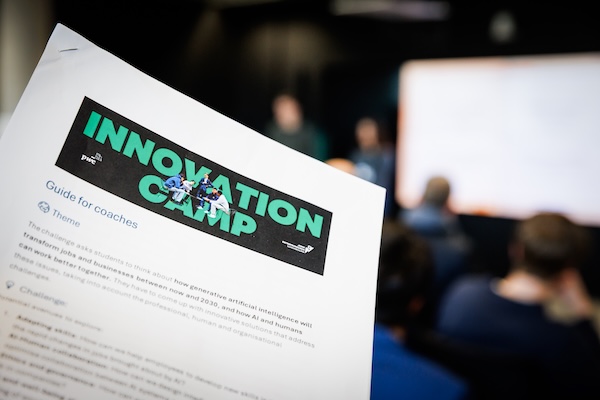 Credit: Jonk Entrepreneuren Luxembourg © Pierre Levy
Credit: Jonk Entrepreneuren Luxembourg © Pierre Levy
On Thursday 3 April 2025, non-profit association Jonk Entrepreneuren Luxembourg (JEL), in collaboration with PwC, hosted an innovation camp aimed at questioning the impact of artificial intelligence (AI) in the workplace.
As reported by JEL, the 28th edition of the camp, which took place at PwC’s Experience Centre in Luxembourg-Gasperich, invited 43 students, aged sixteen to 20, from twelve schools, to question “How will artificial intelligence transform jobs and businesses by 2030 and how can we work better alongside it?”.
Executive Coach at the PwC Experience Centre, Pierre-André Honnay and PwC Audit Partner, Patrick Schon, opened the event. Participants then took part in a hands-on workshop involving Microsoft’s generative AI software “Copilot”. This was followed by a tour of the premises.
Throughout the day, a dedicated team of experts guided the students and, at the end of the event, ten teams pitched their projects to a jury made up of PwC professionals.
First place was awarded to the group “Opti-Chain”, made up of Valeria Germano (Lycée Aline Mayrisch), Rafael Sanches Costa (Lycée Technique de Lallange), Emily Nielsen (Lënster Lycée) and Joshua Delles (École Privée Fieldgen). Their predictive AI solution and intelligent automation for sustainable logistics help anticipate disruptions, optimise operations and meet ESG requirements using an agile and responsible approach.
Second place went to “Breaking Brains”, whose app uses AI to analyse posture and public speaking skills through immersive simulations. With personalised feedback, their tool helps users make measurable progress. The team included Flavia Lippert (Lycée Robert Schuman), Filip Bozic (Lycée Michel Lucius), Marie Vandendriessche (École Européenne II) and Liam Bahbout (Lycée Aline Mayrisch).
Third place went to a team that developed an AI assistant designed to enhance customer experience, speed up market access and improve real-time decision-making through continuous learning. The group included Sam Thoss (Maacher Lycée), Danaé Prost (Lënster Lycée), Uriel Baucou (Lycée Français du Luxembourg – Vauban) and Farouq Bennani (École Internationale de Differdange et d’Esch-sur-Alzette).
Managing Partner at PwC Luxembourg, François Mousel, shared his enthusiasm while presenting the awards. He stated: “Seeing these young people take on complex questions about AI and human collaboration gives me great hope for our future.” He added: “Their innovative thinking shows that Luxembourg’s next generation is ready to lead in a world reshaped by artificial intelligence. At PwC, we believe in nurturing talent and building bridges between education and the ever-evolving world of work.”
JEL also reported that this edition of the innovation camp marked the launch of its platinum-level partnership with PwC Luxembourg, describing it as “an alliance set to create more meaningful initiatives that support young people in their professional development.”
Director at JEL, Sven Baltes, expressed his gratitude towards PwC Luxembourg for its commitment to this initiative. Mr Baltes said: “I warmly thank PwC Luxembourg for the excellent collaboration during the Innovation Camp held on 3 April 2025. Their welcome, engagement with students and the relevance of the challenge all played a big part in making the day a success.” He added: “Their involvement allowed the students to enjoy a meaningful and educational experience - developing key skills such as critical thinking, creativity and teamwork. We look forward to continuing this valuable partnership and creating new opportunities for Luxembourg’s youth.”
SM








